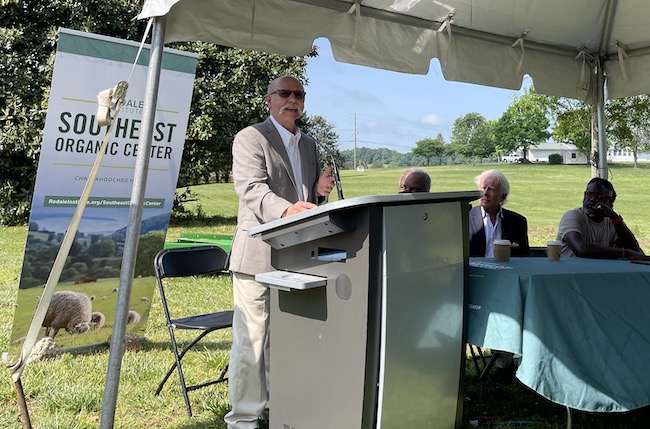
A Very Influential Member of Congress Meets with Regenerative Organic Proponents, Supports Testimony in front of the House Agriculture Committee
(Congressman David Scott of Georgia, seated, speaking with Finian Makepeace, co-founder of Kiss the Ground. Images courtesy of Congressman Scott's office.)
Please help support Organic Insider by forwarding this newsletter to your colleagues and asking them to subscribe. Thank you so much.
An absolute game-changing development took place last week in Georgia that should have organic advocates all feeling very hopeful.
On May 4th, Congressman David Scott (GA-13), chairman of the House Agriculture Committee, visited the Rodale Institute Southeast Organic Center, located in Georgia’s Thirteenth Congressional District, to discuss the role of regenerative organic agriculture in strengthening the nation’s food supply and to highlight the research being conducted within the Rodale Institute’s network of farms.
“It was a pleasure meeting with the farmers and researchers right here in my district, who are at the tip of the spear when it comes to regenerative organic agriculture,” stated Congressman David Scott. “American families rely on agricultural infrastructure for their produce and groceries every day, and it is imperative for our nation’s food supply that we continue to implement policy at the federal level that not only bolsters sustainable farming practices but also mitigates the effects of climate change.”
According to Jeff Moyer, CEO of Rodale Institute, Congressman Scott and his staff were previously not familiar with the power of regenerative organic farming methods or the scalability and impact it has on farmers’ ability to manage the uncertainties of weather due to climate change, markets and supply chain interruptions caused by pandemics, war and political unrest. He was also excited to hear that ‘regenerative organic’ has recognition in the marketplace via the Regenerative Organic Certified label, a third-party certification with clear standards and strict enforcement.
This lack of familiarity, however, did not dampen the Congressman’s enthusiasm. In fact, quite the opposite.
“Congressman Scott said at the podium that we, as a nation, need to be looking at regenerative organic to deal with soil health and our fragile supply chain, and that he wants us to testify in front of the full House Agriculture Committee, so that his colleagues can learn what he learned during his visit. Congressman Scott also said that he wants CSPAN to cover the testimony, giving the whole nation the opportunity to learn about regenerative organic. The day could not have gone any better,” said Jeff Moyer.
BIG AG’S PLATFORM IS SIMPLY NOT VIABLE
Getting our federal government to pay attention to the merits of regenerative organic farming has been an uphill battle, to say the least.
And it certainly doesn’t help matters when the Secretary of the USDA, Tom Vilsack, has come out against the EU’s Farm to Fork policy — which, by 2030, aims to cut pesticide use by 50% and increase organic farmland to 25% — and instead has opted for “a voluntary, incentive-based approach” that favors biotechnology and gene editing.
That being said, the media is shining a bright light on how this technology is failing.
Last August, The New York Times wrote a jaw-dropping story called “Attack of the Superweeds: Herbicides are losing the war — and agriculture might never be the same again.” This piece reaffirmed what all of us in organic have known for a long time; that GMOs and their accompanying pesticides — which include herbicides and insecticides — comprise an agricultural platform that just doesn’t work.
Now, with the war in Ukraine, our country’s reliance on synthetic fertilizers made from inputs sourced from that part of the world has put conventional farmers in a far more precarious position.
If what we have now were working, in terms of a stable and climate-friendly food supply, one could conclude that the chairman of the House Agriculture Committee may not be as enthusiastic about another approach. However, Congressman Scott voiced his support in having Jeff Moyer and Steve Nygren, founder of Serenbe, both testify before the Committee.
“Regenerative organic farming, with its cover crops and crop rotation, is a real and practical solution for climate change, and it reduces the need for chemical inputs,” said Jeff Moyer. “Most importantly, we can deploy this system at scale. To have Congressman Scott link ‘regenerative’ and ‘organic’ in one sentence was critical. We were thrilled.”
It goes without saying that to have such an influential member of Congress take a sincere interest in regenerative organic farming is a huge development for our industry, and we will be sure to keep Organic Insider readers informed as this story unfolds.

(Jeff Moyer)

(From l. to r., CheFarmer Matthew Raiford, co-owner of Strong Roots 9, Gilliard Farms, and Board Chair for Georgia Organics; Steve Nygren; Congressman David Scott; Jeff Moyer)

 |
With gratitude, 
Max Goldberg, Founder |
Quick Hits
* Definitely watch the trailer for Into the Weeds: Dewayne “Lee” Johnson vs. Monsanto Company.
* Corley Kenna’s leadership at Patagonia has earned her a SABRE Award for Outstanding Individual Achievement.
* Meet the women behind the fast-growing organic boba shops.
* Straus Dairy Farm’s carbon-neutral goal draws near as CDFA approves the first-ever red seaweed supplement to reduce methane emissions.
* How Sambazon is making açai a touchstone of conscious commerce.
* The CEO of chemical giant Syngenta wants everyone to stop organic farming.
* In the face of numerous threats, bees are producing less honey.
* Want To Save The Planet? Invest In Better Ag Policy, Not Biotech Meat
* Investigative journalist Carey Gillam’s latest project — The New Lede
* Known for human rights violations, Nespresso is now a B Corp.
New Organic Products
Regenerative Organic Certified Coconut Butter from Philosopher Foods
In honor of its 9th birthday, Philosopher Foods has introduced the first and only Regenerative Organic Certified coconut butter -- silver designation. Stone ground in small batches over a 24-hour period, it utilizes a low-speed, low-temperature process to ensure that the fat, fiber and protein are all evenly distributed. Available on the company's website and at Whole Foods Market in Northern California.On-The-Go Snack Packs from Back Roads Granola
Wanting to give its customers a more convenient option to take on the go, Back Roads Granola has come out with Snack Packs in 1.5oz bags. Available in eight different flavors of organic granola or just oats, everything is gluten-free, Glyphosate Residue Free certified, vegan and Non-GMO. Grain-free options available as well. Only available on the company's website.Essential Collection from Michelob Ultra
New from Michelob Ultra is its Essential Collection of organic seltzer. Made with coconut water and fruit juice, the hard seltzer pack comes in four flavors -- blueberry watermelon, strawberry guava, berry hibiscus and kiwi lime. Each drink has zero added sugar, 4% alcohol by volume and 90 calories per 12-ounce can.Allergen Baby Oatmeal from Ready. Set. Food!
Ready. Set. Food! has come out with an organic baby oatmeal -- a first-of-its-kind baby food. Made of 100% organic milled whole grain oats, it is mixed with nine of the top allergens (peanut, egg, milk, cashew, almond, walnut, sesame, soy and wheat) that account for about 90% of all childhood food allergies. Designed by allergists and with babies in mind, this new offering assists parents in introducing allergens early and often, per USDA guidelines.
Weekly News Summaries


Two Years After Lemon Perfect was Spotted in Beyoncé’s Limo, the Superstar is Now a Backer
By Christine Hall
The music icon, along with Beechwood Capital, Goat Rodeo Capital and others, participated in Lemon Perfect's $31M Series A.
Florida Approves Risky Release of Billions More of GE-Mosquitoes
In an incredibly reckless decision, the Florida Department of Agriculture and Consumer Services approved the extension of Oxitec's two-year field trial, which includes releasing several billion more genetically-engineered mosquitoes into the Florida Keys -- one of Florida's most ecologically sensitive areas.

Heavy Rains are Causing Massive Damage to Organic Growers in California


California has a Tentative Plan to Double its Organic Farmland by 2045
By Kate Galbraith and Tara Duggan
As part of California's 2022 Scoping Plan, which aims to get the fifth largest economy in the world to carbon neutrality by 2045 or earlier, organic farmland will be a massive priority.

Biden administration asks U.S. Supreme Court Not to Hear Bayer's Bid to Dismiss Claims by Customers who Contend that its Roundup Weedkiller Causes Cancer
By Carey Gillam
Bayer has seen the Supreme Court as its last and best hope to avoid potentially billions of dollars in damages.

GMO Wheat Approved for Consumption in Australia and New Zealand
By Chuck Abbott
A disastrous decision but, for now, no GMO wheat is approved for sale in the U.S.


Farmers in Ghana Look for Organic Alternatives as Russian Fertilizer Costs Skyrocket
By Senanu Tord
Expect to see a lot more of this, not just in Africa but all over the world -- including the U.S.

Brightseed closes $68M Series B to accelerate A.I. Discoveries and Launch Own Ingredients
By Stephen Daniells
The funding, which was led by Temasek, will enable Brightseed to advance natural compound discovery and clinical validation.

Purdue's Ag Innovation Fund Invests in GMO Detection Startup
By Wes Mills
Agtech startup NanoBio Designs LLC says its technology is able to reduce genetic testing of seeds from days to minutes.
Want to share this newsletter on social media? You can use this link: Newsletter Link
The material in this newsletter is copyrighted and may be reprinted by permission only. All requests must be in writing. Please use our contact form to request republication rights.
Newsletter Archive
Quick Hits
* Definitely watch the trailer for Into the Weeds: Dewayne “Lee” Johnson vs. Monsanto Company.
* Corley Kenna’s leadership at Patagonia has earned her a SABRE Award for Outstanding Individual Achievement.
* Meet the women behind the fast-growing organic boba shops.
* Straus Dairy Farm’s carbon-neutral goal draws near as CDFA approves the first-ever red seaweed supplement to reduce methane emissions.
* How Sambazon is making açai a touchstone of conscious commerce.
* The CEO of chemical giant Syngenta wants everyone to stop organic farming.
* In the face of numerous threats, bees are producing less honey.
* Want To Save The Planet? Invest In Better Ag Policy, Not Biotech Meat
* Investigative journalist Carey Gillam’s latest project — The New Lede
* Known for human rights violations, Nespresso is now a B Corp.




